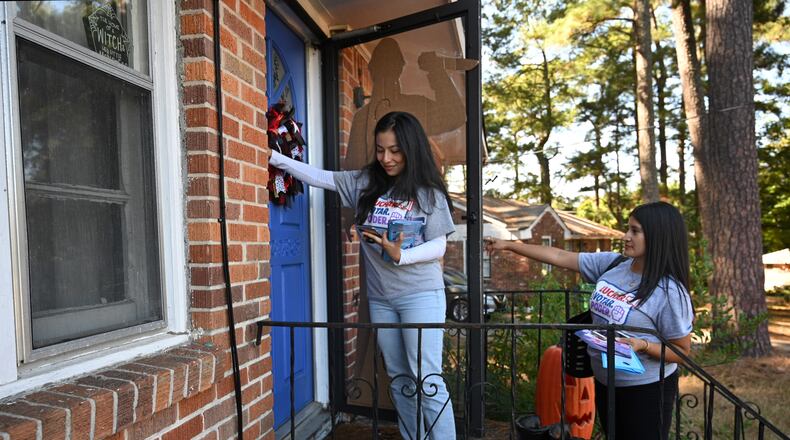Roughly one in 10 Georgia residents are Hispanic, and their growth in numbers has come with increased political power.
A new survey commissioned by the Georgia Association of Latino Elected Officials, a nonprofit focused on civic engagement, is shedding light on what may be on many Latino voters’ minds as they head to the Georgia ballot box in 2024.
According to the survey results, published on Wednesday, kitchen table concerns lead the pack: When asked to identify the issues most important to them, nearly half of respondents selected inflation and the rising cost of living. Improving wages and creating jobs was also a top priority, as was lowering the costs of healthcare.
Those concerns are linked to the economic hardship many reported having experienced in the past year. According to the GALEO survey, over half of respondents indicated that they were forced to postpone medical or dental care because of cost considerations, and nearly half said they had to take on a second job or a side hustle. In addition 37% of respondents said they skipped medication to save money, 30% missed a payment on their mortgage or rent, and 29% got money from friends and family to cover personal needs. Latinos showed support for a range of hypothetical bills – from efforts to expand voting rights to legislation that would make in-state tuition available to immigrants – but the single most supported policy initiative was a law that would make housing more affordable.
“The significance of the recent survey results cannot be overstated … These insights are not just statistics; they are guides for our organizing efforts,” said Jerry Gonzalez, GALEO’s CEO, in a statement.
Gonzalez also noted that the surging growth of the state’s Latino electorate, from 10,000 in the early 2000s to an estimated 400,000 now “serves as a powerful testament to the rising influence of our community.” The overall Latino population in the state is roughly 1 million.
A leading concern outside pocketbook issues was centered around immigration, with survey respondents indicating support for protecting immigrant rights. Climate change is also top of mind, and it’s an issue that many Georgia Latinos have had firsthand experiences with, be it in the U.S. or in their home countries. Just under half of respondents said they or their loved ones have had to move because of extreme weather events associated with climate change.
GALEO conducted the survey in collaboration with BSP Research, a Democratic firm with extensive experience polling Latino voters. Analysts spoke with 500 Hispanic Georgia residents in English or Spanish, including a mix of native- and foreign-born respondents. The poll was weighted using U.S. census and American Community Survey data, to ensure it is representative of the Georgia Latino population.
“Latinos in Georgia are pound for pound one of the most significant communities in American politics today. They have an opportunity to not only change how politics is done in Georgia, but the makeup of our federal government. They have already changed the calculus in the US Senate. Whoever can address their needs for a better economic future, access to health care, a better environment, and a good education for their kids, will unlock the opportunity for unprecedented change,” said Stephen Nuño-Perez, a BSP pollster, in a statement.
Despite the role Latino voters could play helping determine closely contested statewide races in Georgia, two thirds of survey respondents indicated they have not been contacted by a political party, political campaign, or voter registration organization so far in 2023.
Full survey results are available at puentesurvey.com
The Atlanta Journal-Constitution and Report for America are partnering to add more journalists to cover topics important to our community. Please help us fund this important work at ajc.com/give
About the Author
Keep Reading
The Latest
Featured



